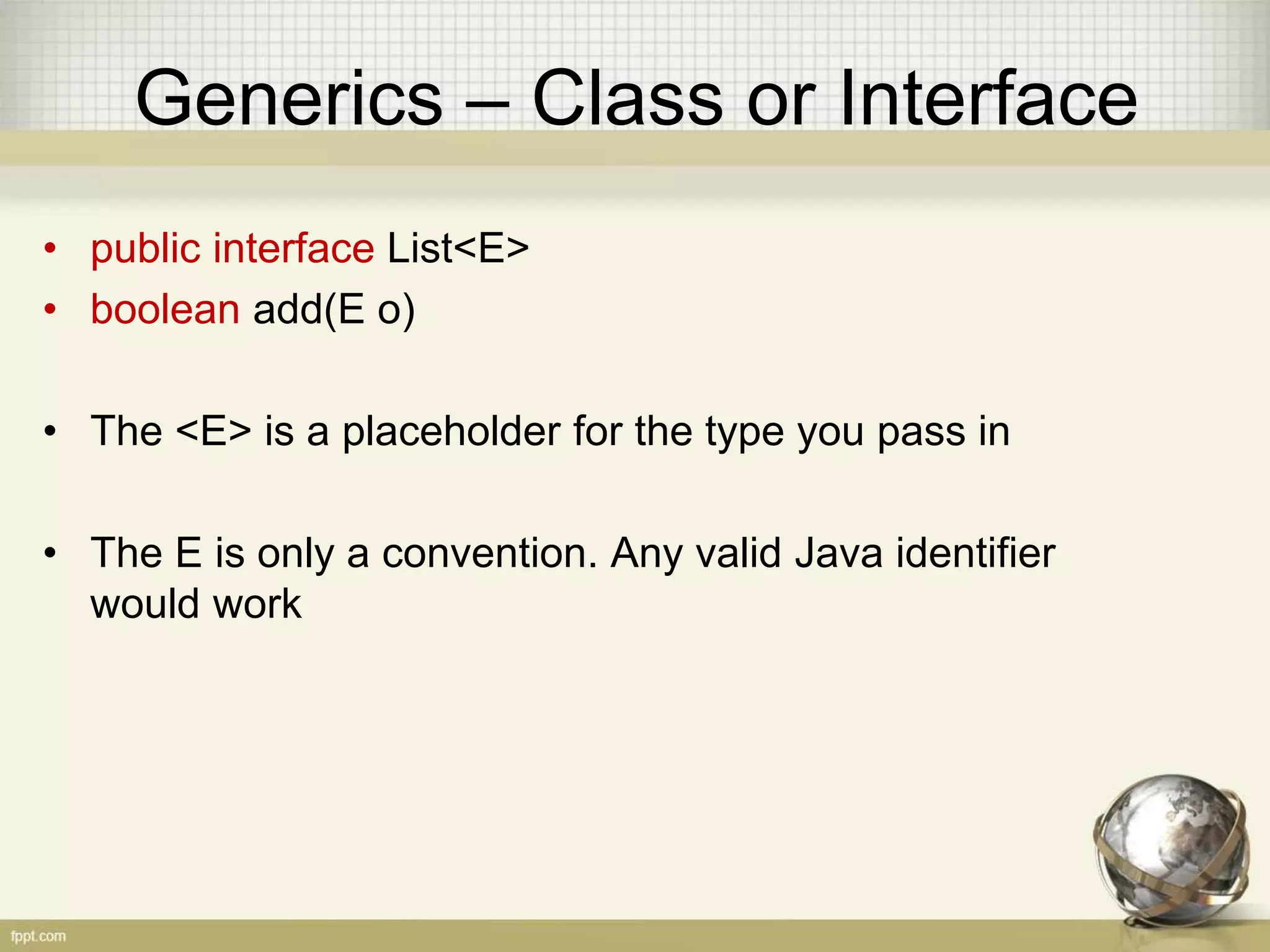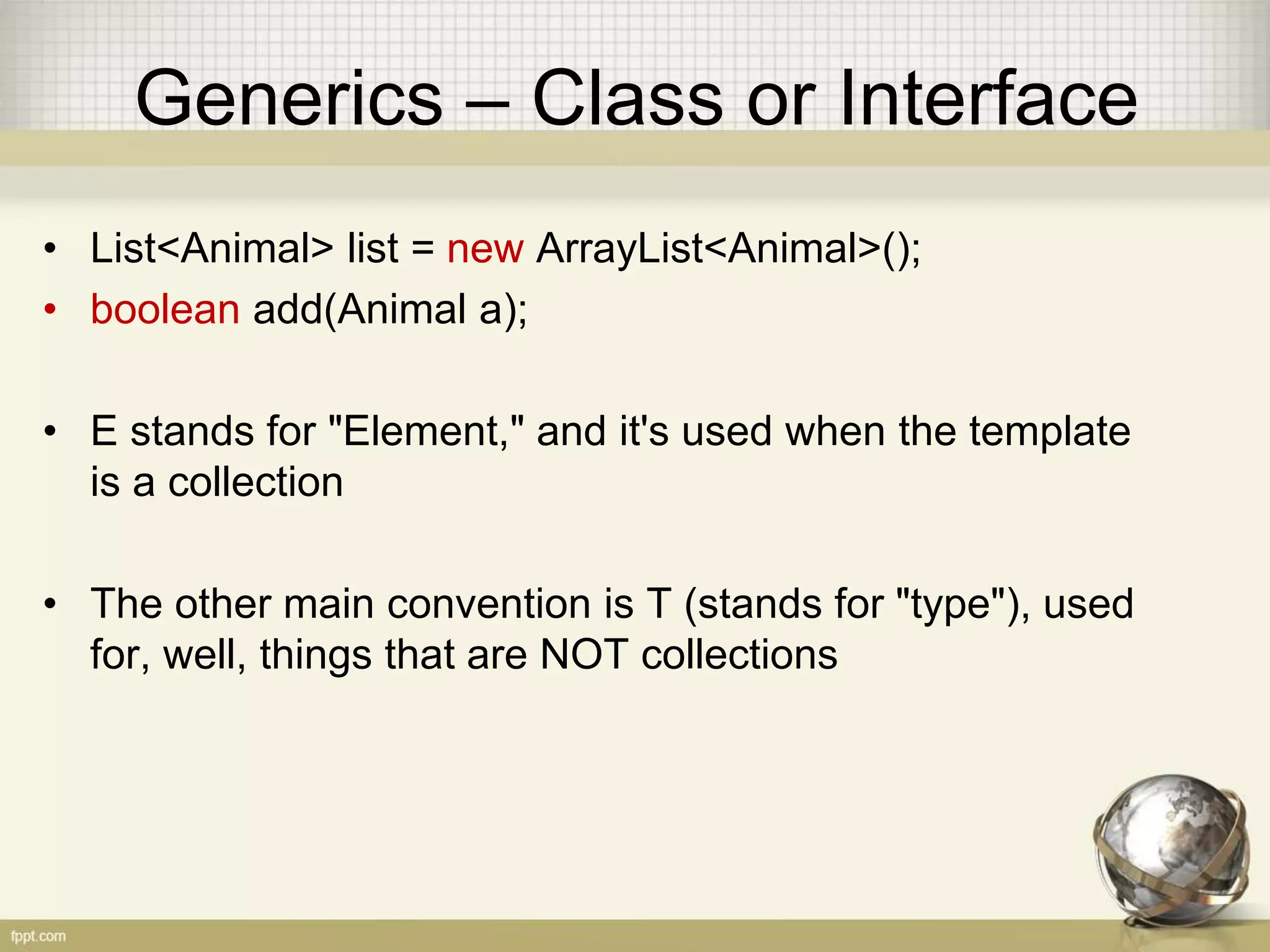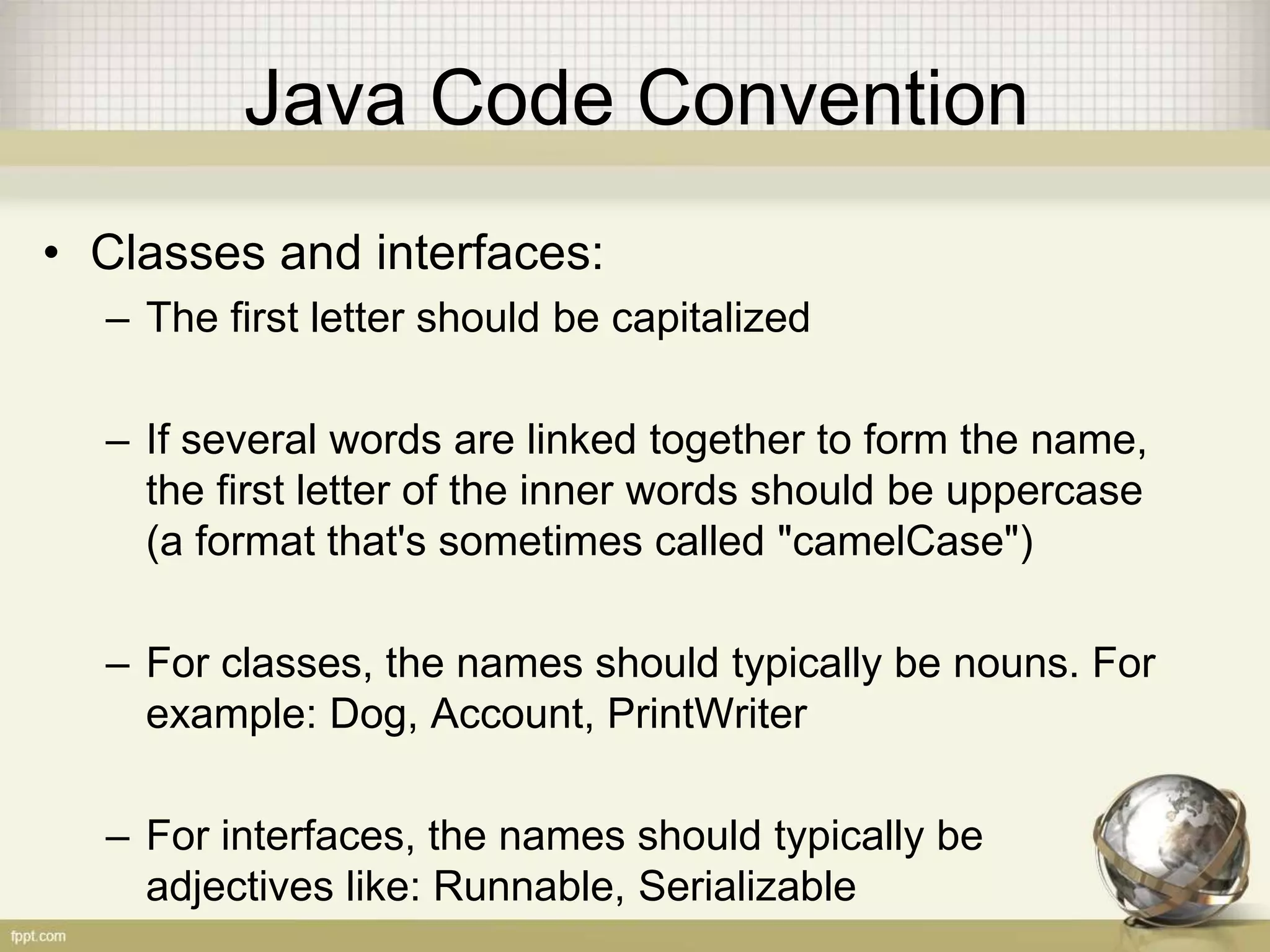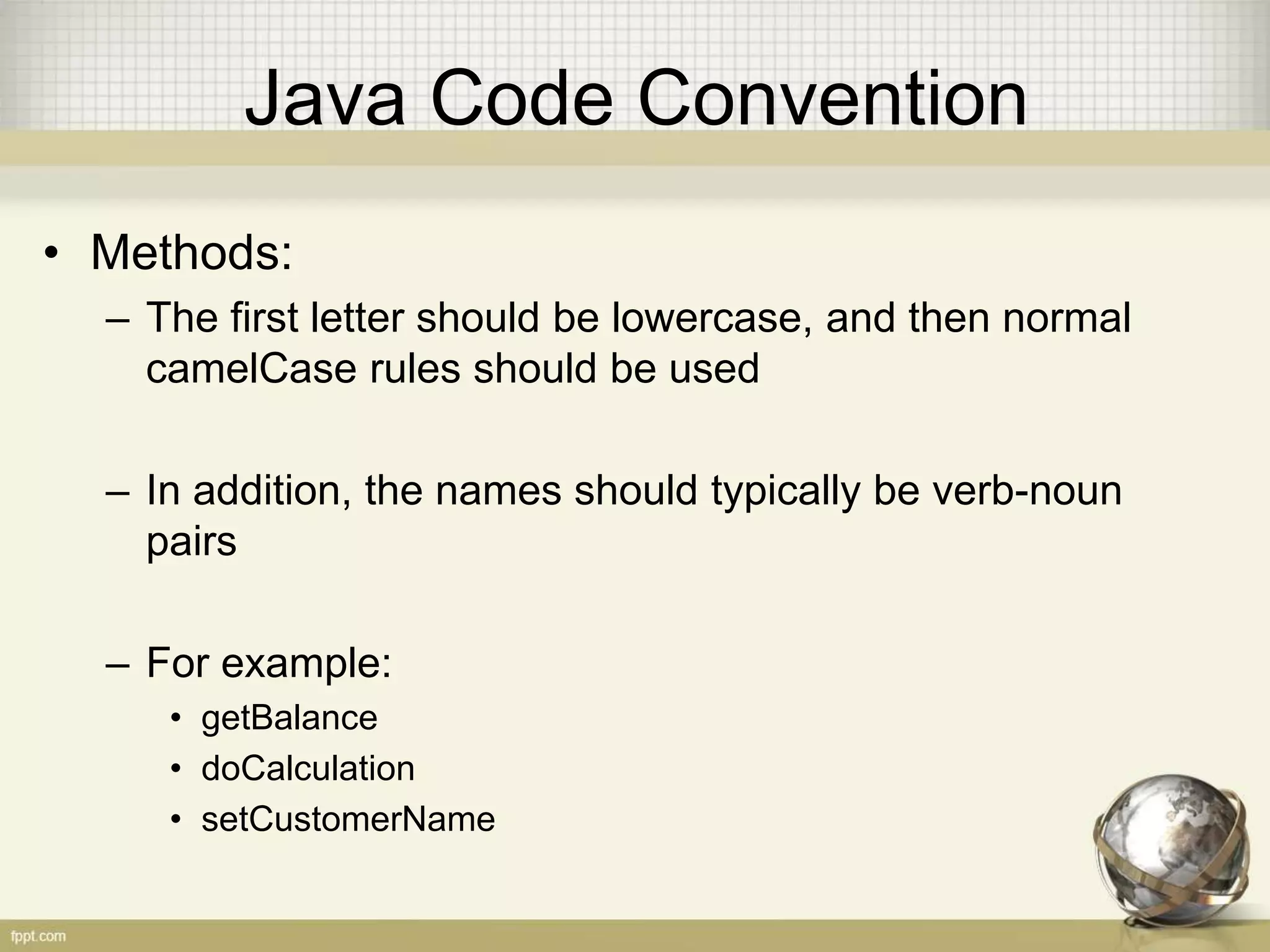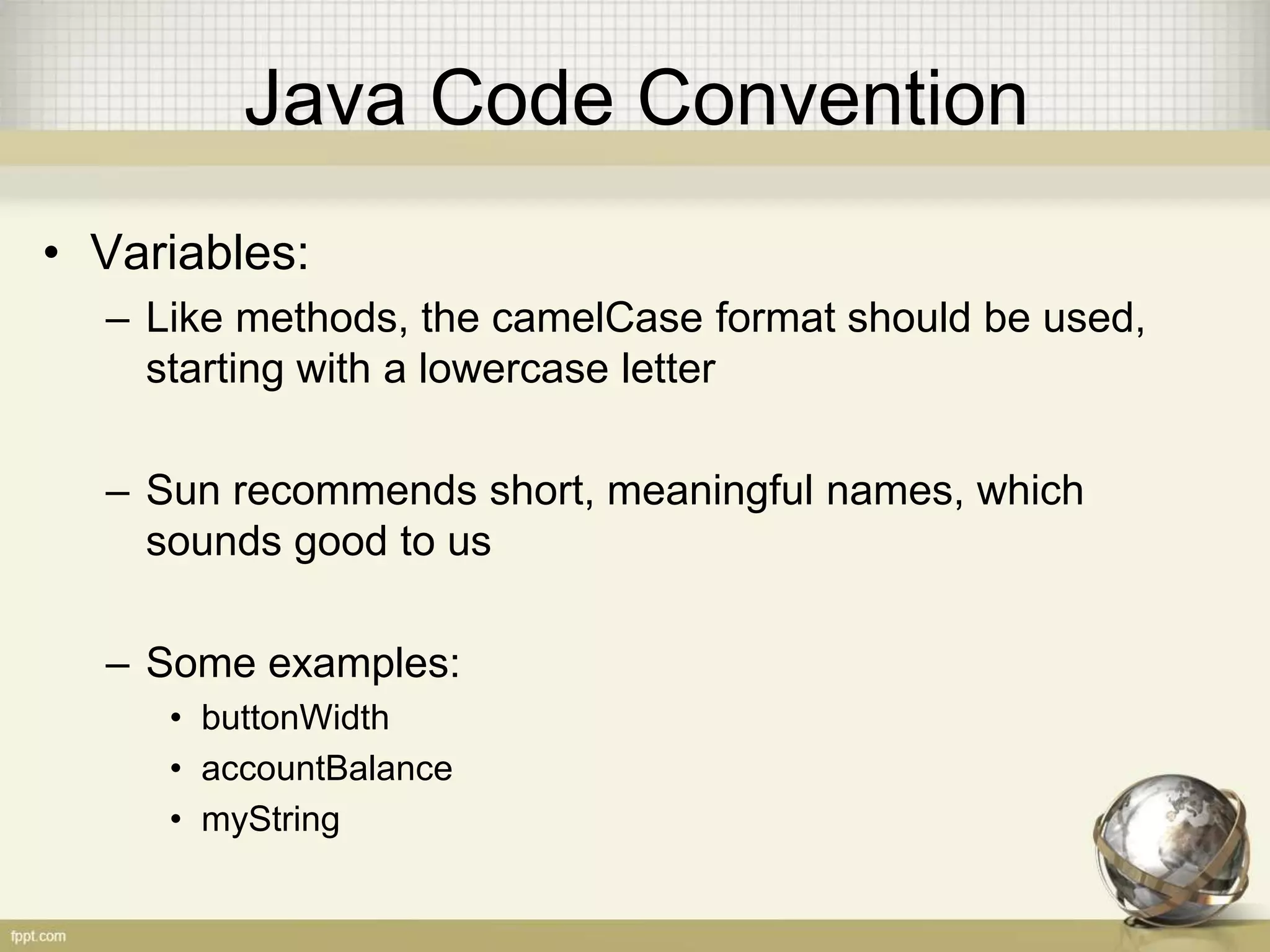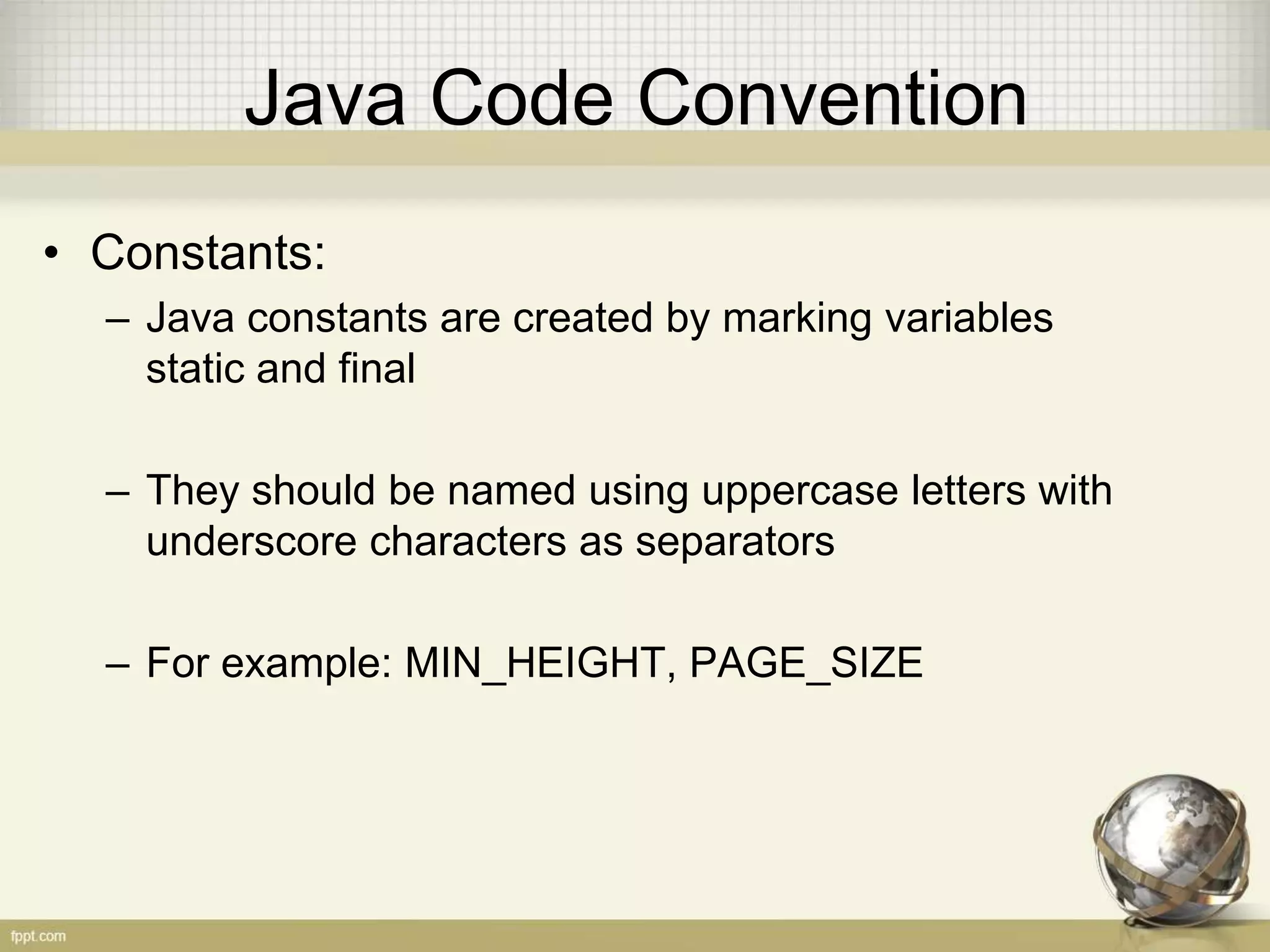The document discusses concurrency and threads in Java. It covers: 1. Concurrency allows running programs or parts of programs in parallel to improve throughput and interactivity. Modern computers have multiple CPU cores that can be leveraged. 2. A thread is a lightweight process that can access shared data in the same process. Java applications run in one process but use multiple threads for parallel processing. 3. Using threads introduces concurrency issues like visibility and access problems that can lead to failures if not handled properly.

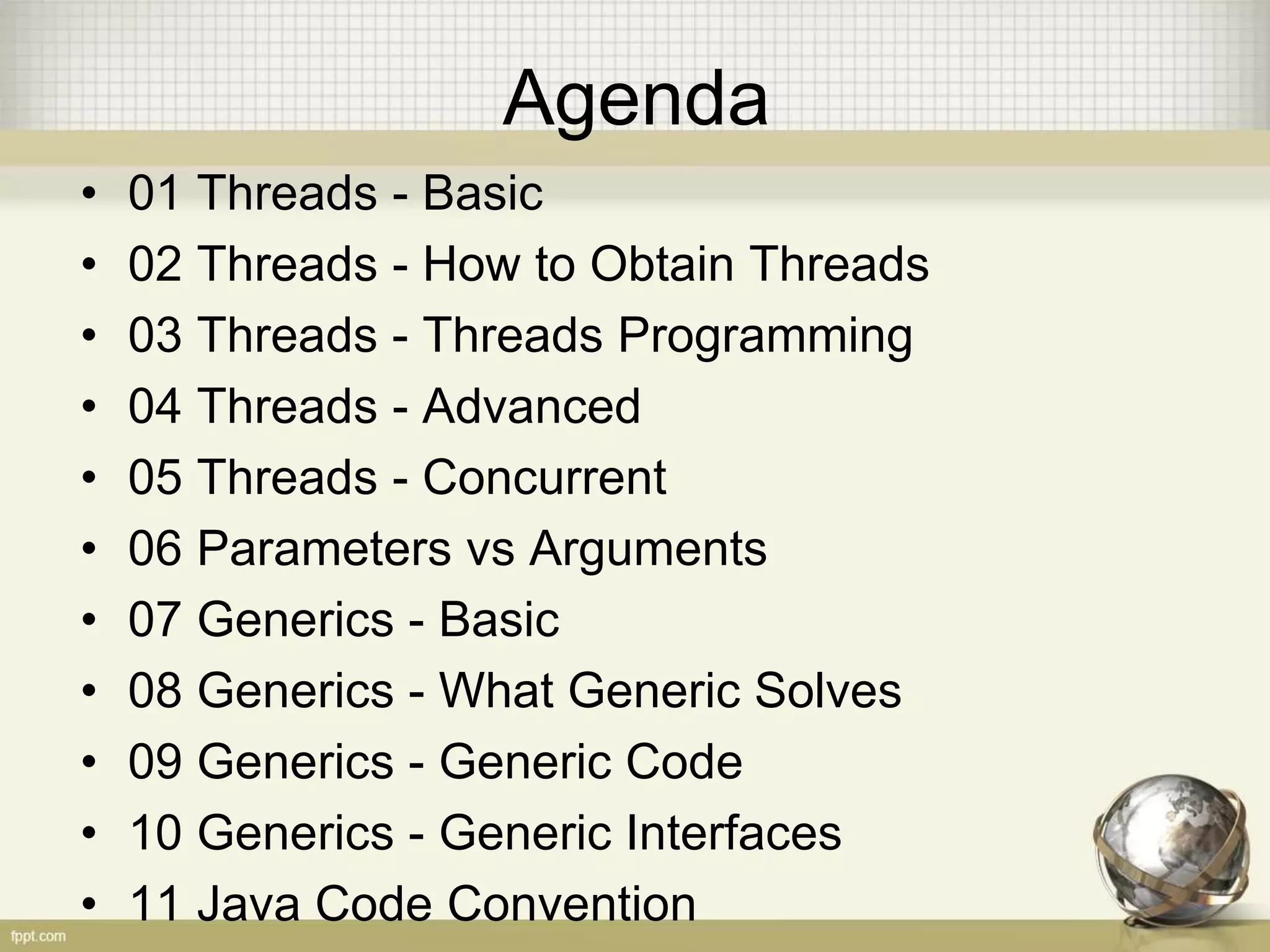
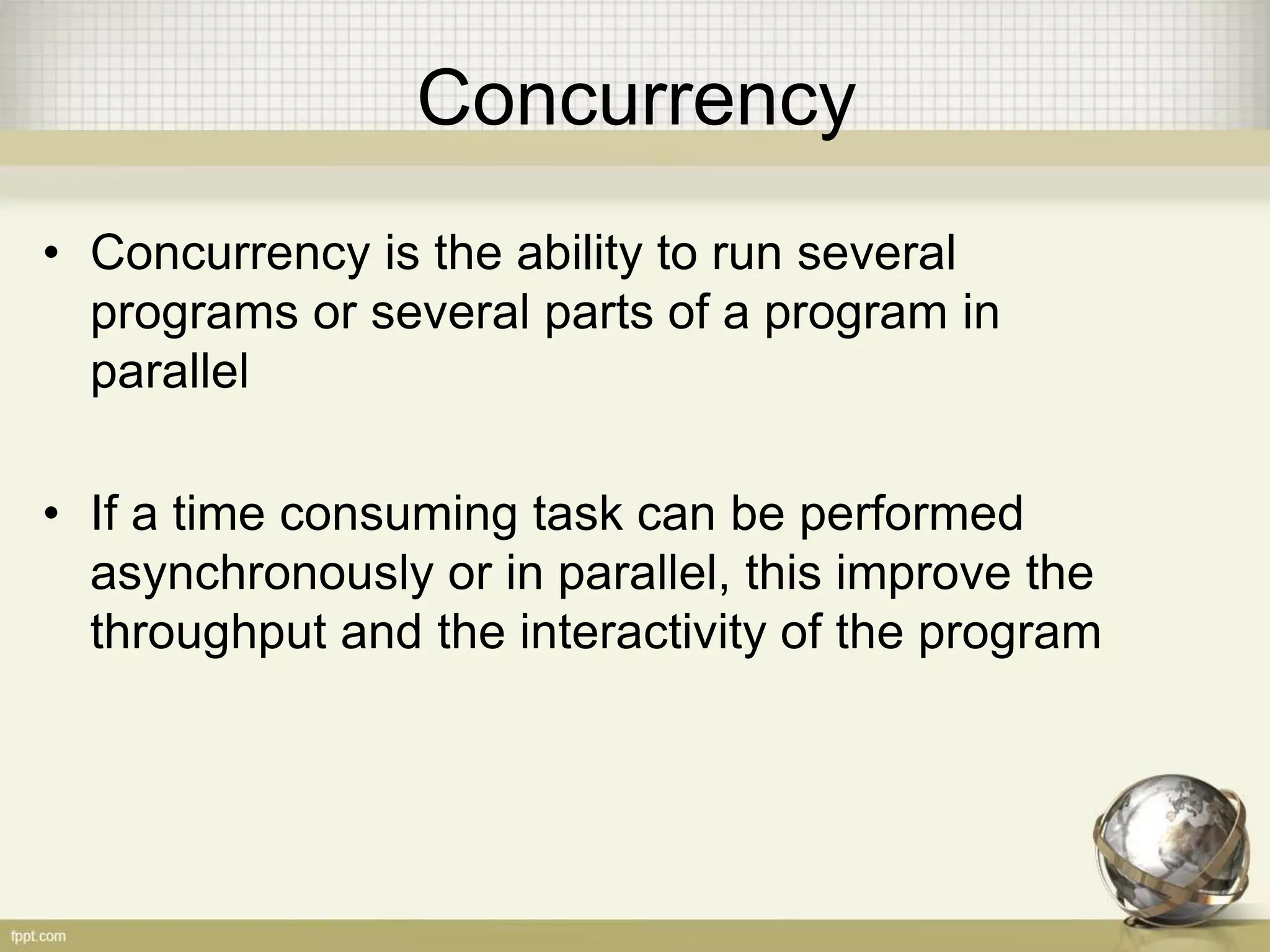
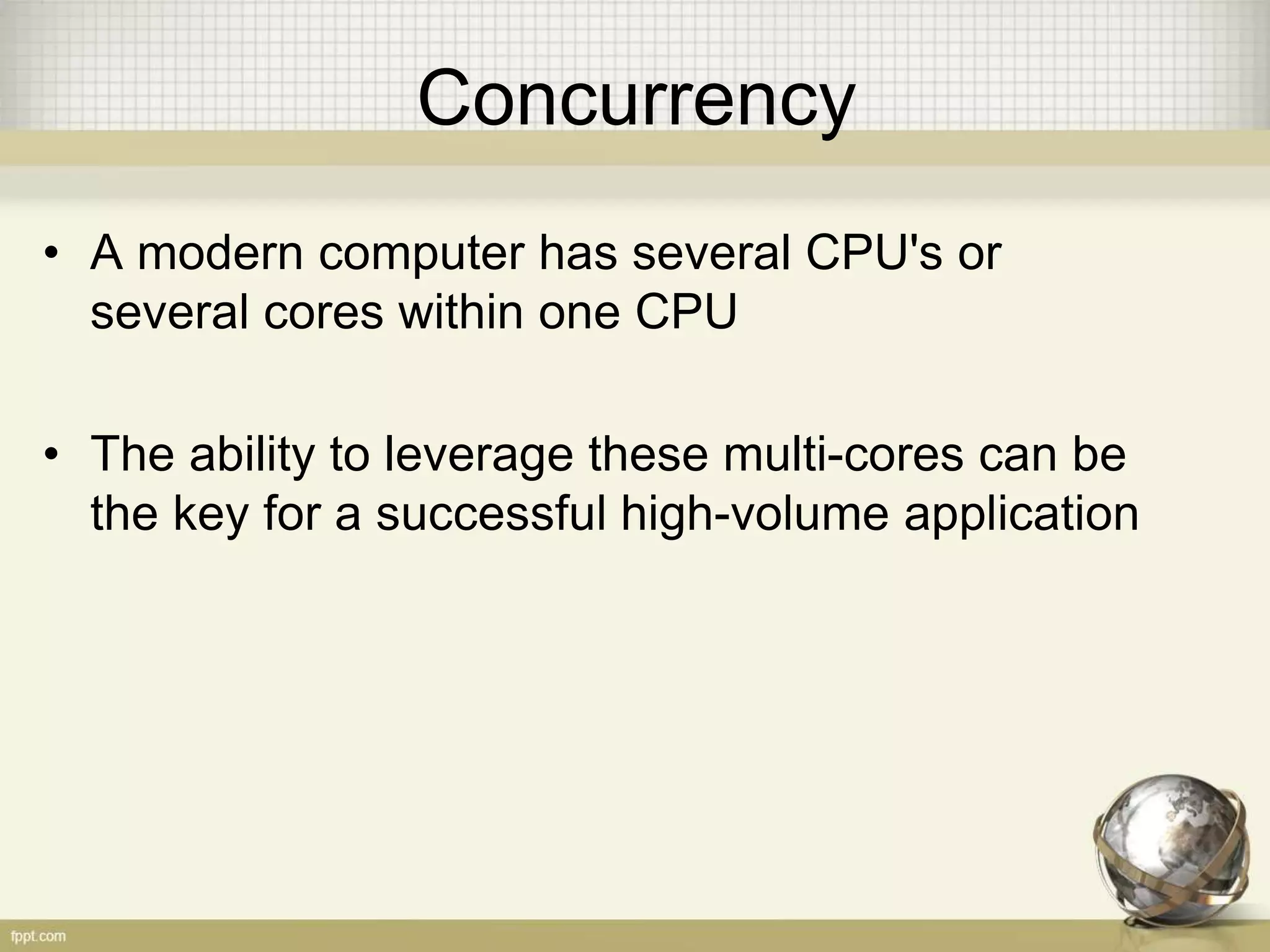
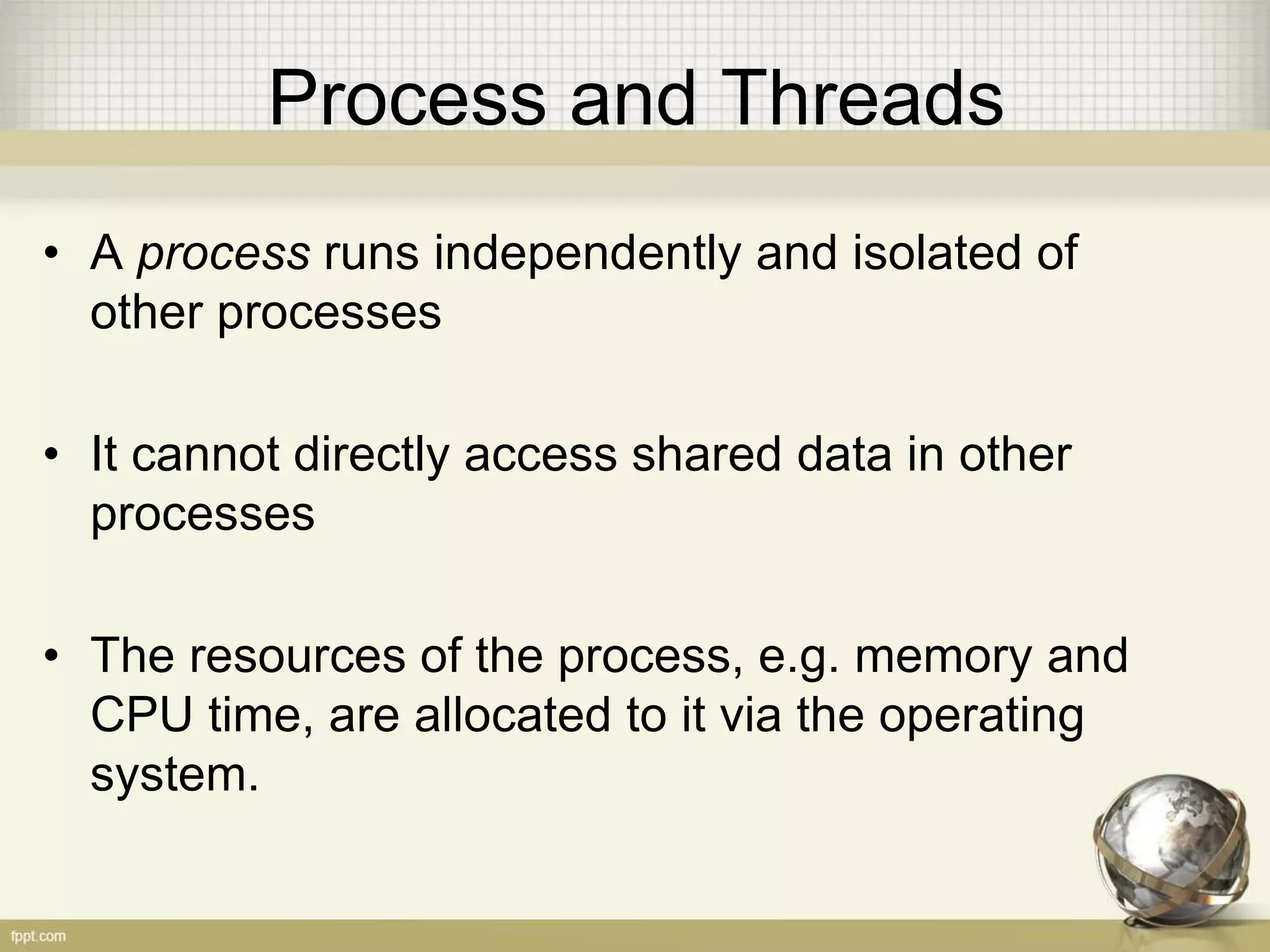
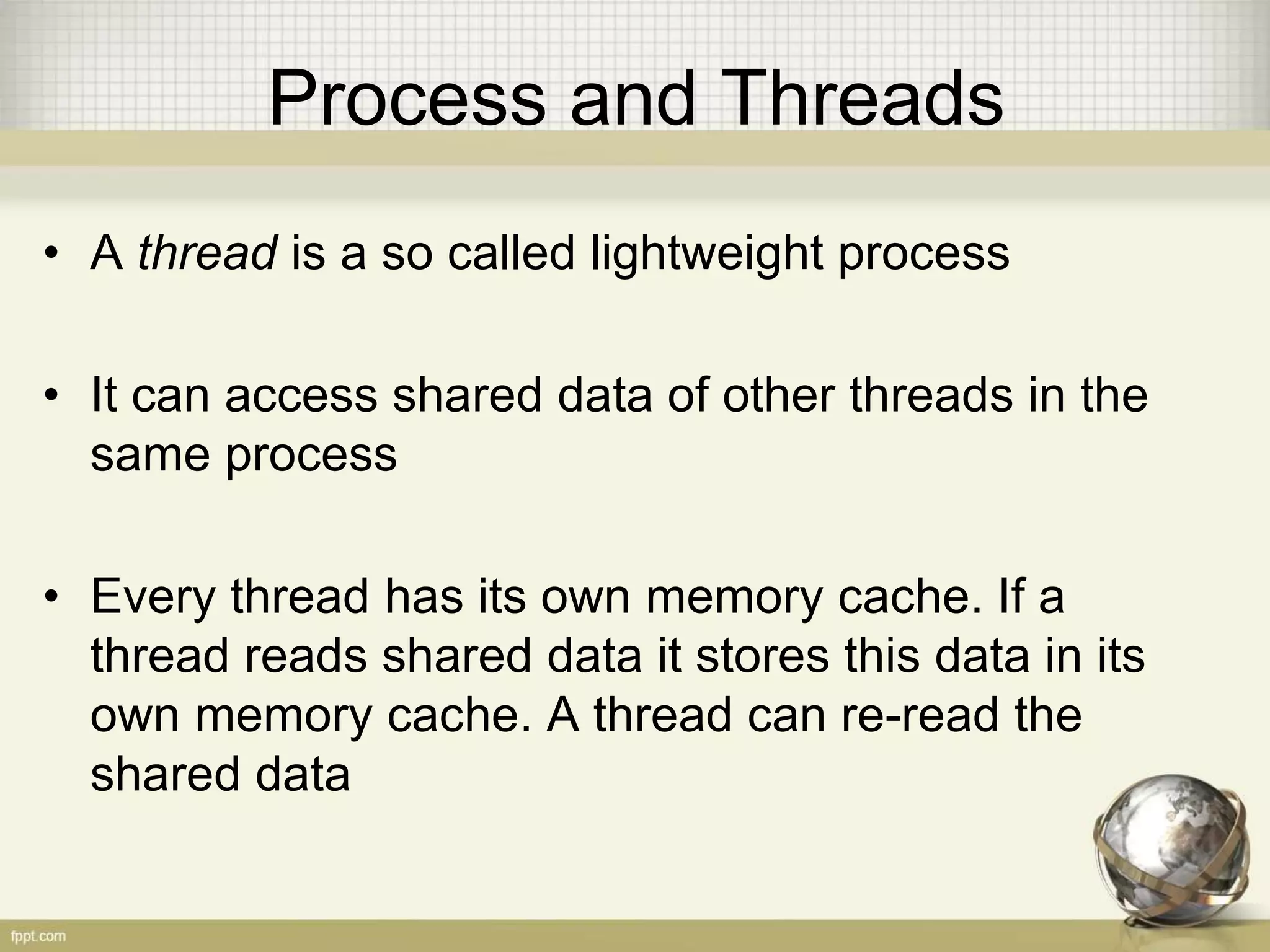
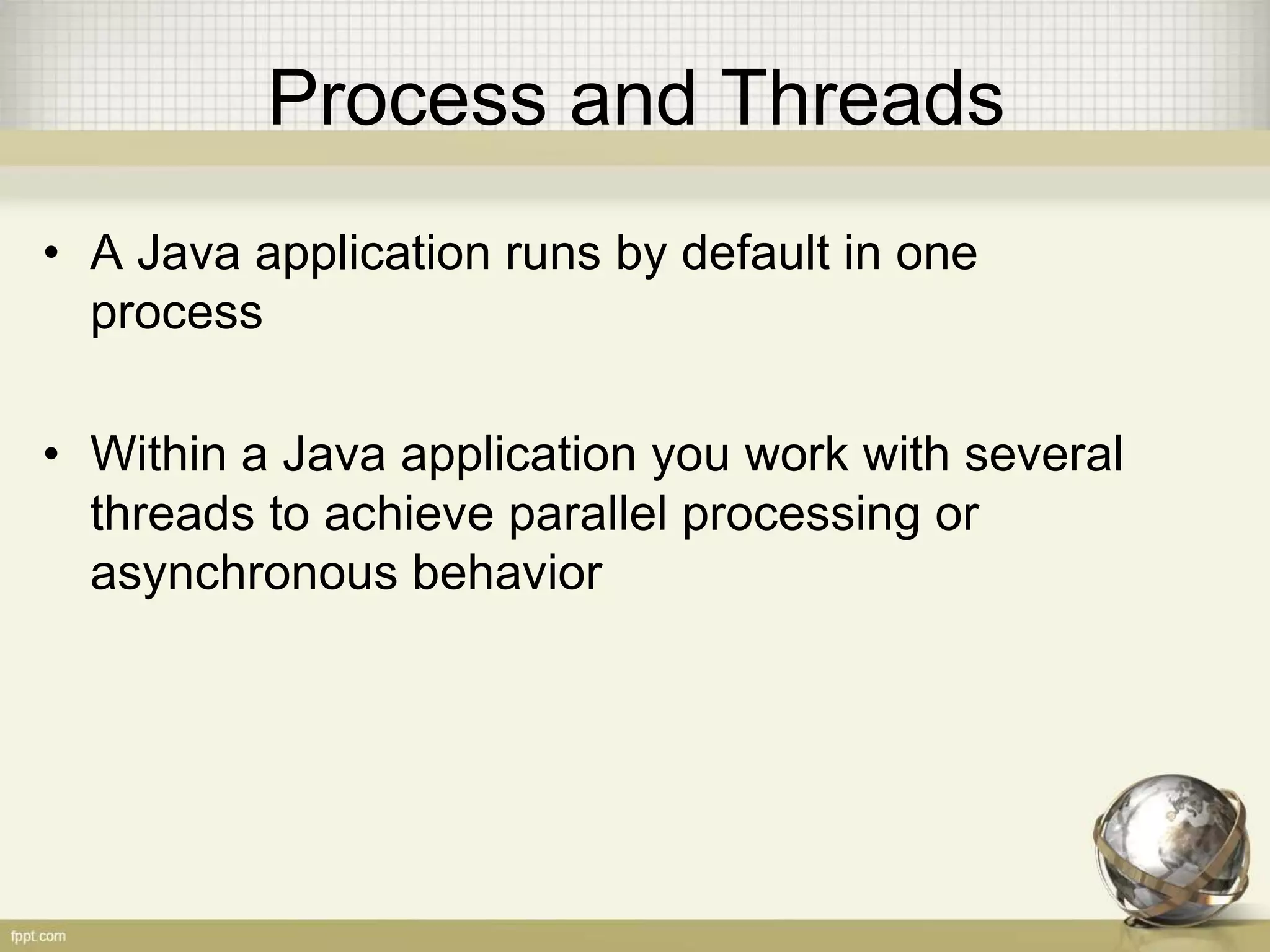
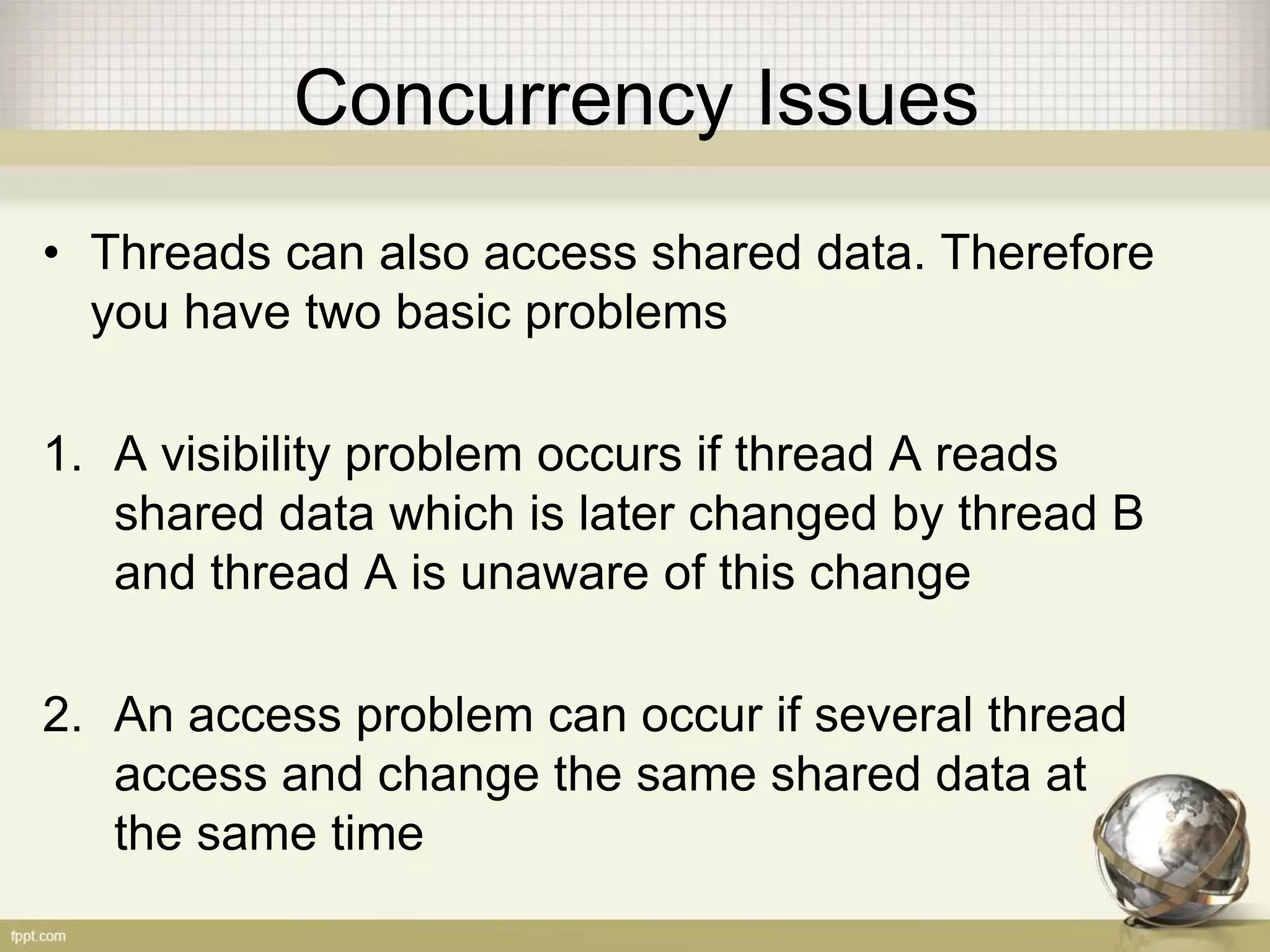
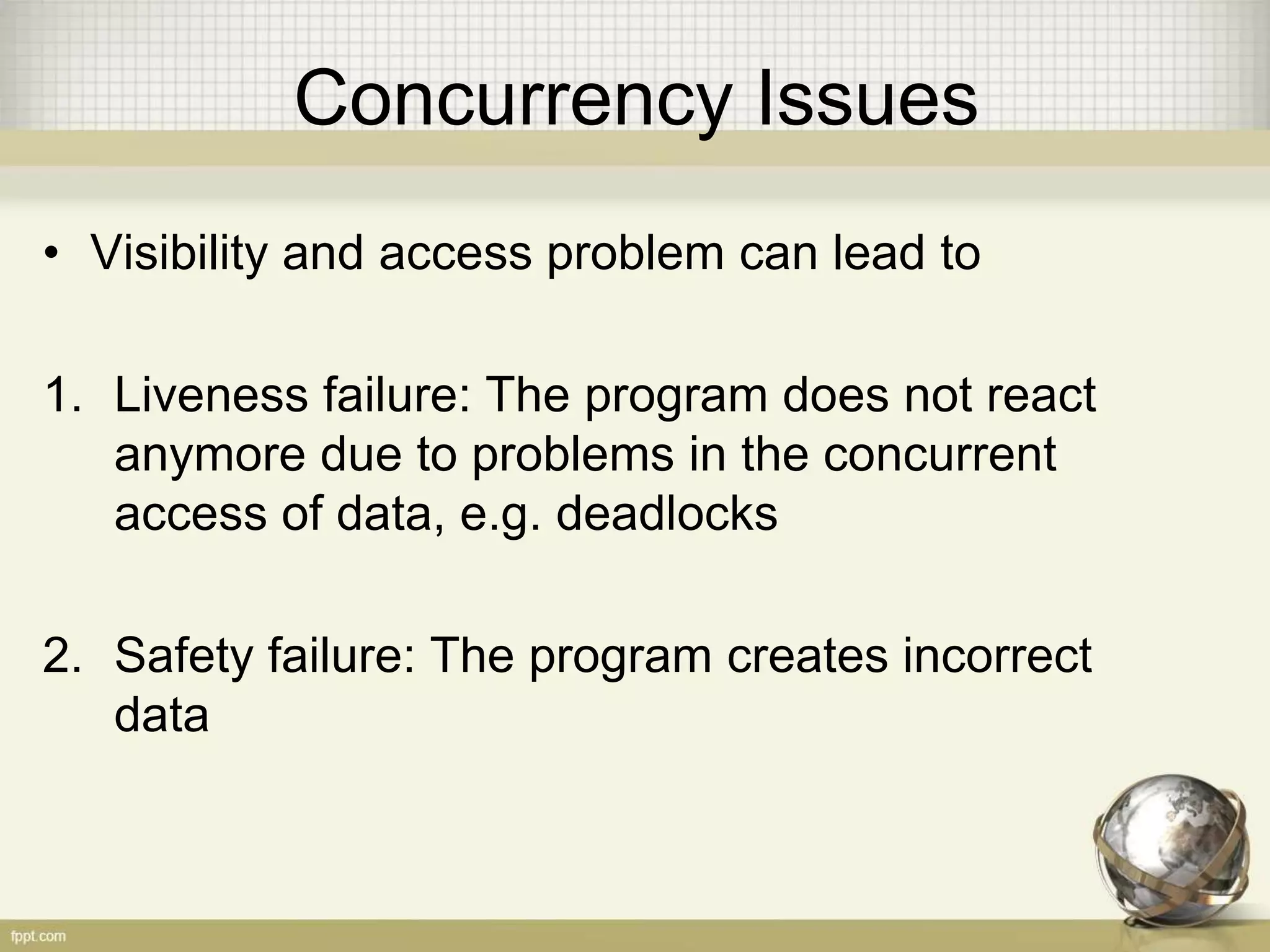
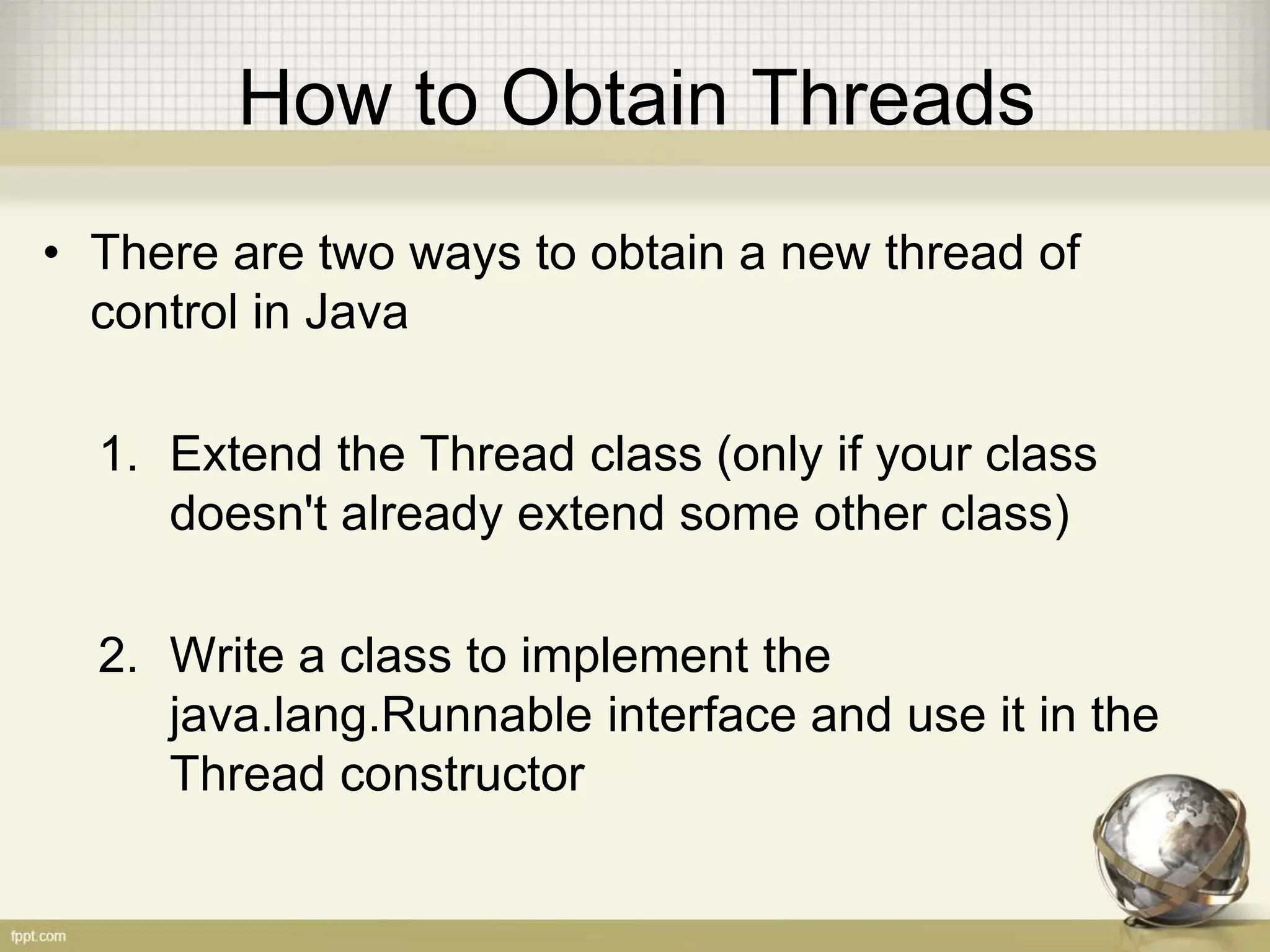
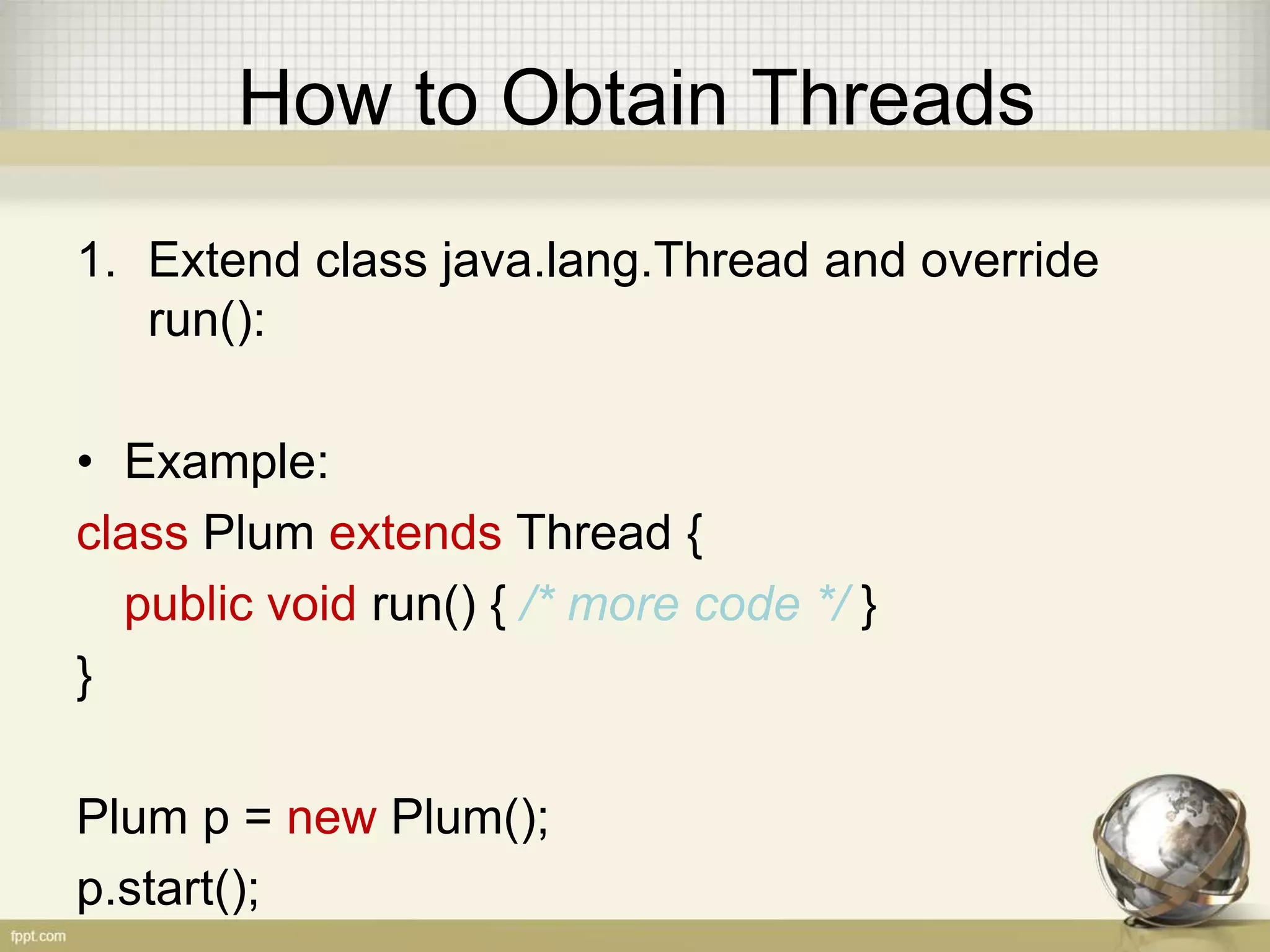
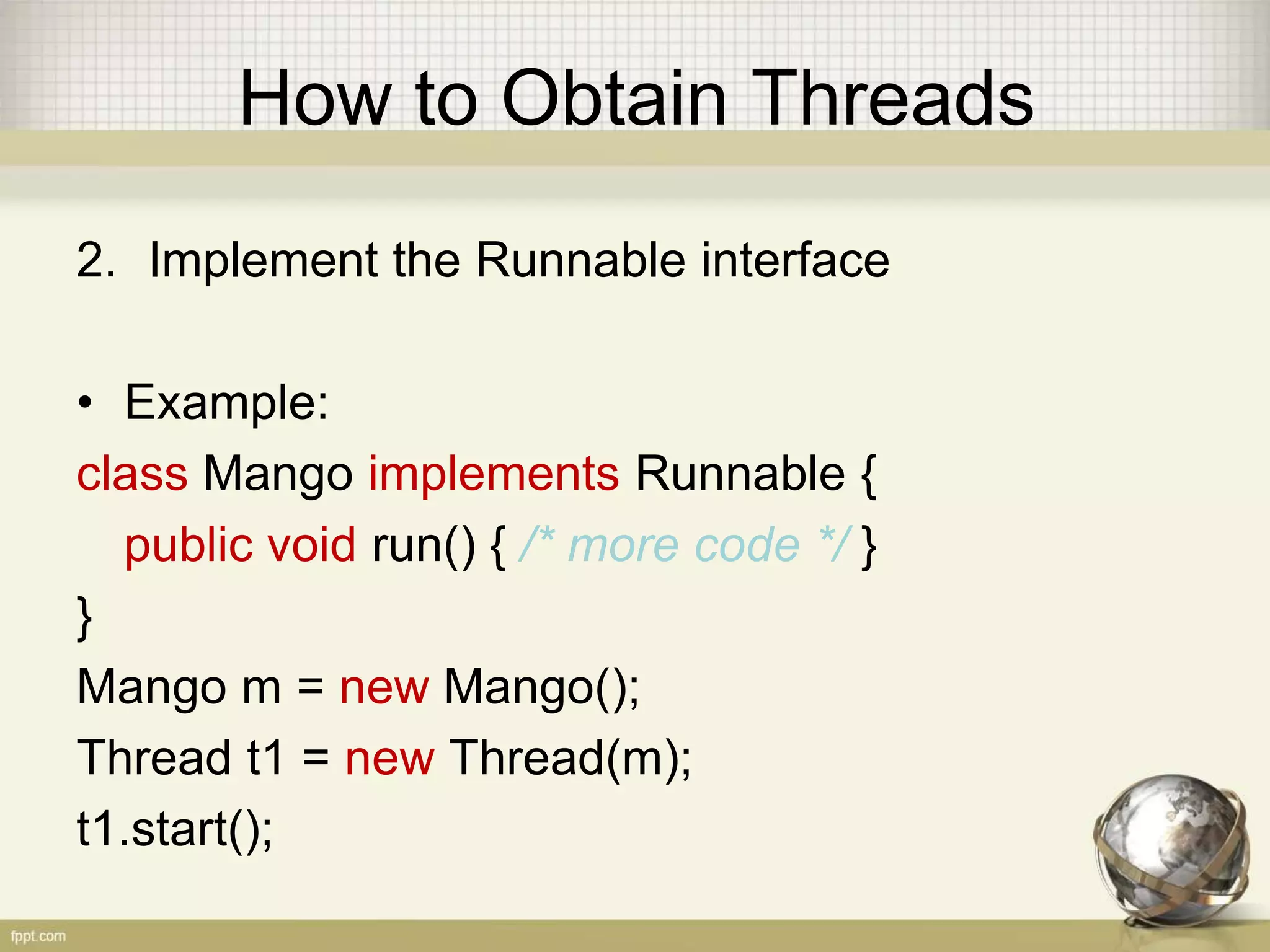
![Threads Programming public class ThreadsTest1 implements Runnable { public void run() { for(int i = 0; i < 3; i++) { System.out.println(Thread.currentThread().getName() + " - " + i); } } public static void main(String[] args) { ThreadsTest1 r = new ThreadsTest1(); Thread a = new Thread(r, "a"); Thread b = new Thread(r, "b"); Thread c = new Thread(r, "c"); a.start(); b.start(); c.start(); } }](https://image.slidesharecdn.com/06javalanguageandooppartvi-140701210946-phpapp02/75/06-Java-Language-And-OOP-Part-VI-13-2048.jpg)
![Threads Programming public class ThreadsTest2 implements Runnable { public void run() { for(int i = 1; i <= 100; i++) { System.out.println(i % 10 == 0? i + " = KELIPATAN 10" : i); try { Thread.sleep(1 * 1000); } catch (InterruptedException e) {} } } public static void main(String[] args) { ThreadsTest2 r = new ThreadsTest1(); Thread a = new Thread(r, "a"); a.start(); } }](https://image.slidesharecdn.com/06javalanguageandooppartvi-140701210946-phpapp02/75/06-Java-Language-And-OOP-Part-VI-14-2048.jpg)
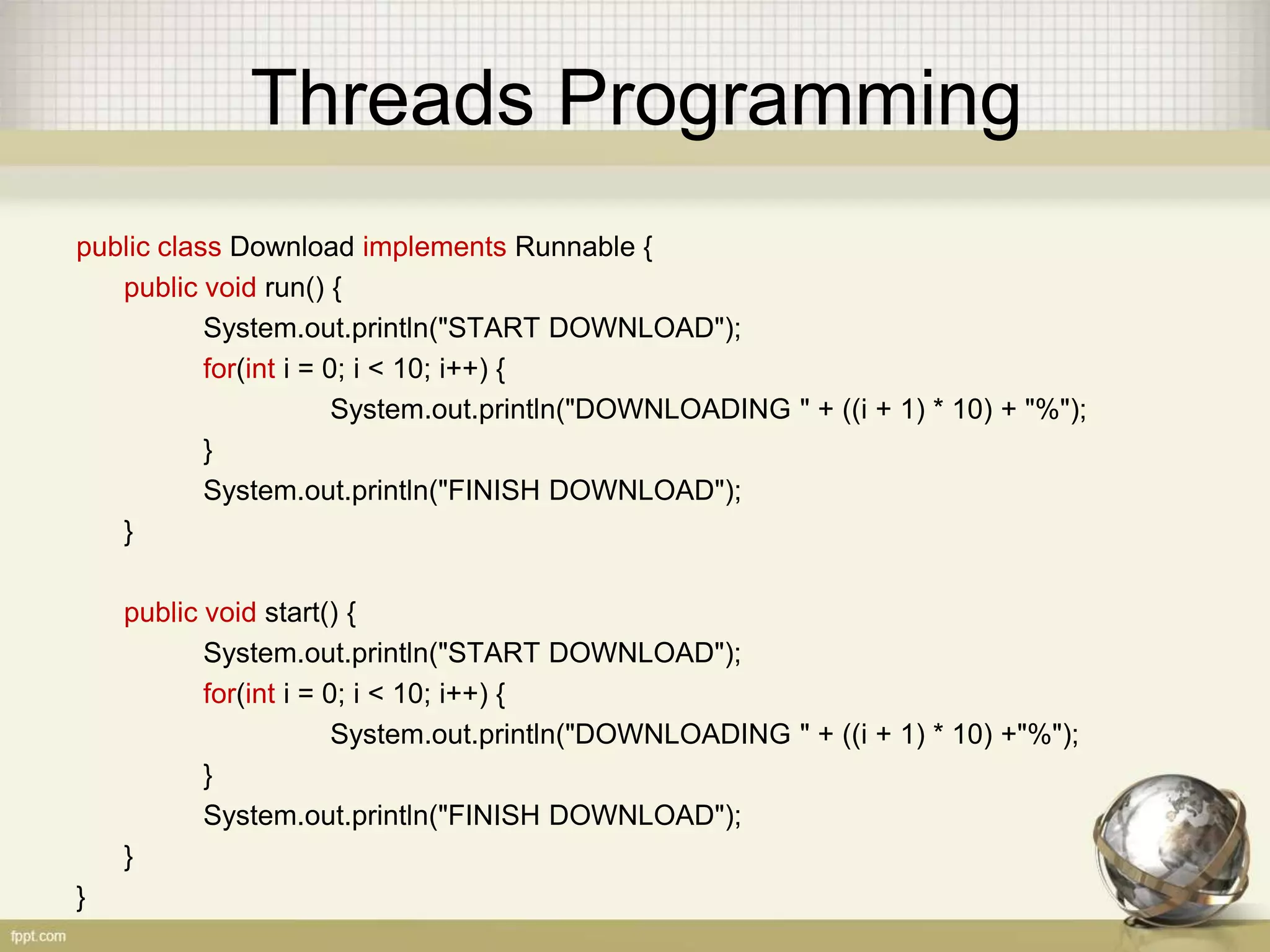
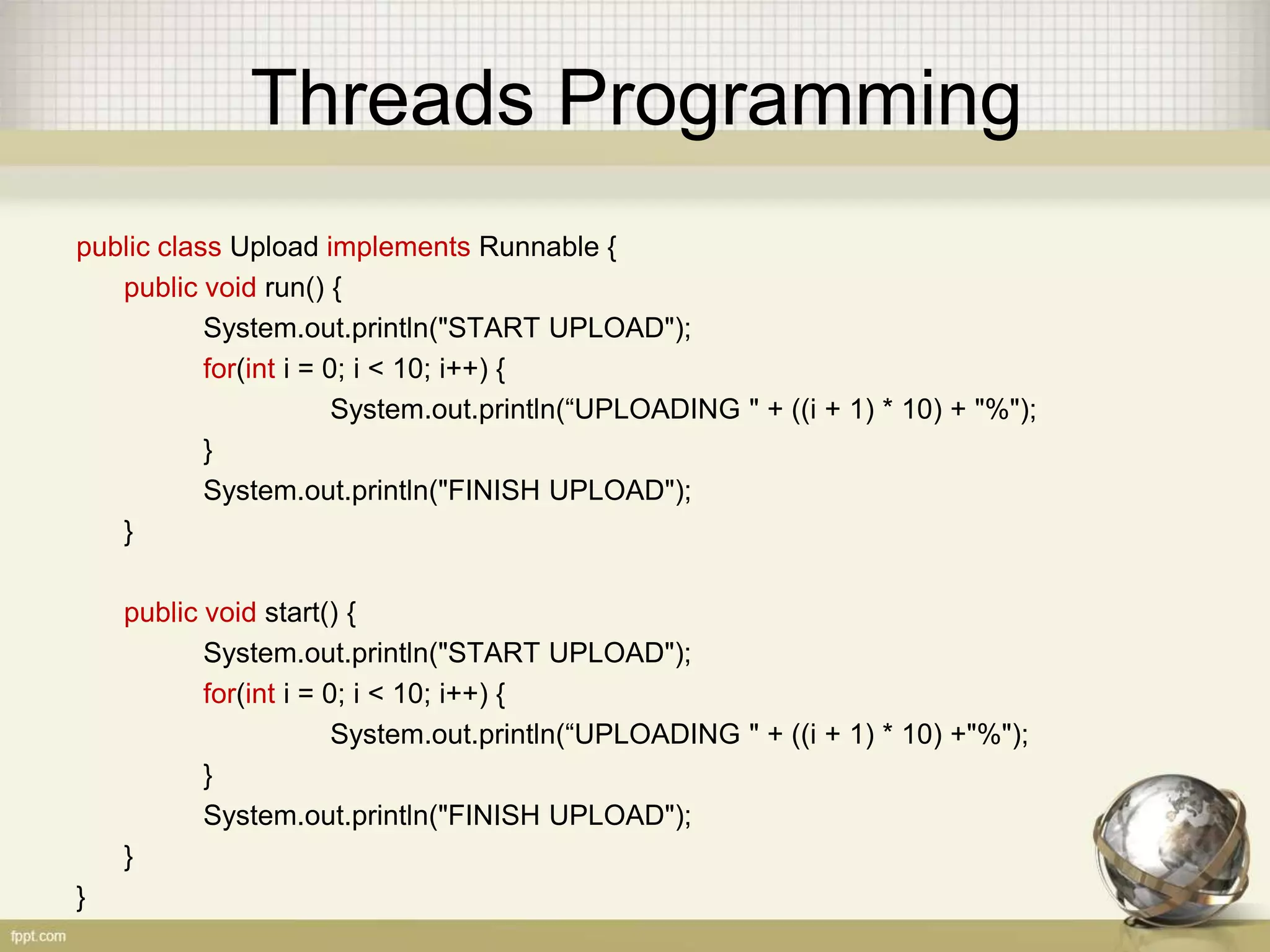
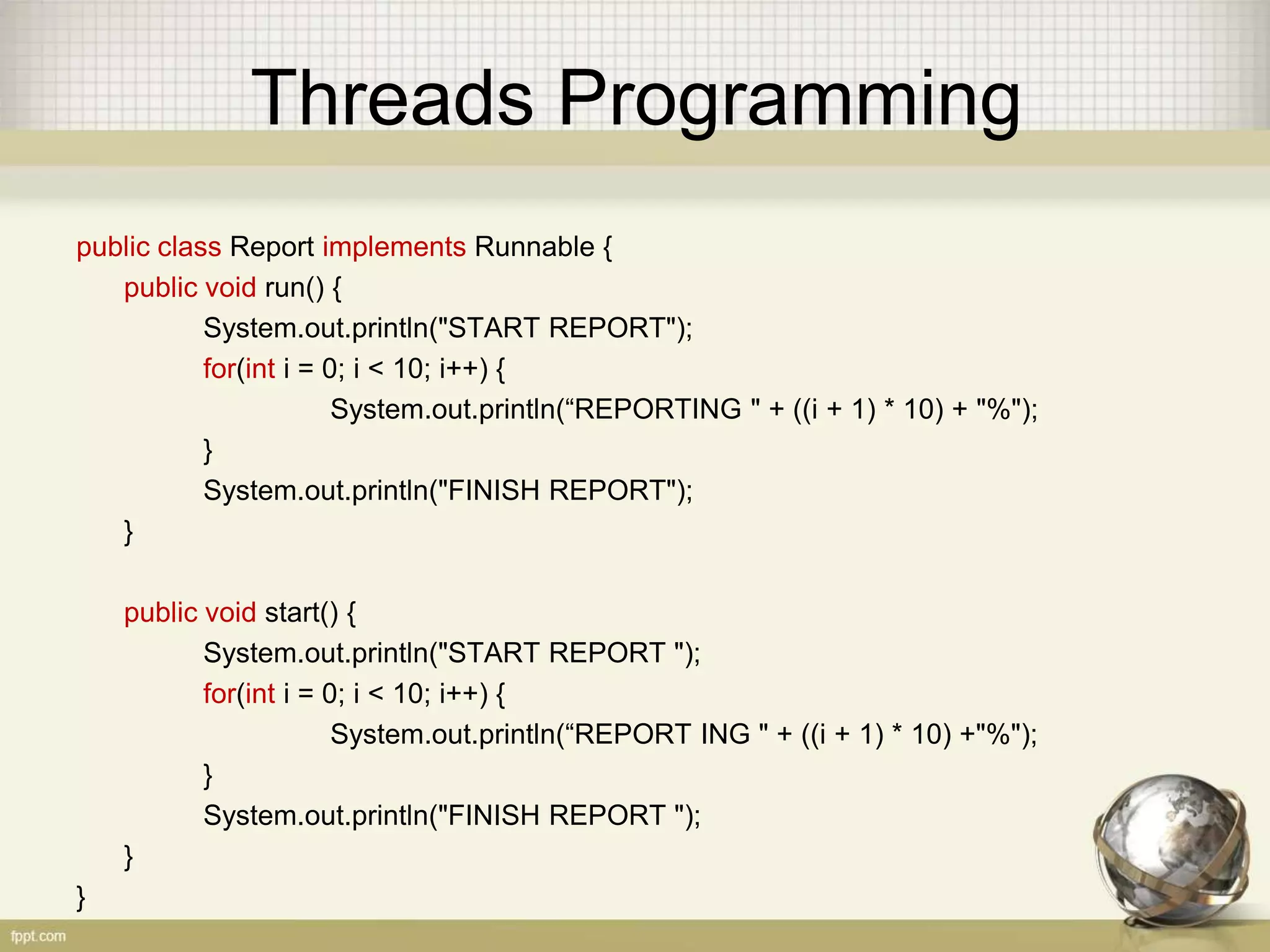
![Threads Programming public class TestThread { public static void main(String[] args) { TestThread t = new TestThread(); t.exampleWithoutThread(); } private void exampleWithoutThread() { Download d = new Download(); Upload u = new Upload(); Report r = new Report(); d.start(); u.start(); r.start(); System.out.println("DOING OTHER THINGS"); } }](https://image.slidesharecdn.com/06javalanguageandooppartvi-140701210946-phpapp02/75/06-Java-Language-And-OOP-Part-VI-18-2048.jpg)
![Threads Programming public class TestThread { public static void main(String[] args) { TestThread t = new TestThread(); t.exampleWithThread(); } private void exampleWithThread() { Download d = new Download(); Upload u = new Upload(); Report r = new Report(); Thread a = new Thread(d, "D"); Thread b = new Thread(u, "U"); Thread c = new Thread(r, "R"); a.start(); b.start(); c.start(); System.out.println("DOING OTHER THINGS"); } }](https://image.slidesharecdn.com/06javalanguageandooppartvi-140701210946-phpapp02/75/06-Java-Language-And-OOP-Part-VI-19-2048.jpg)
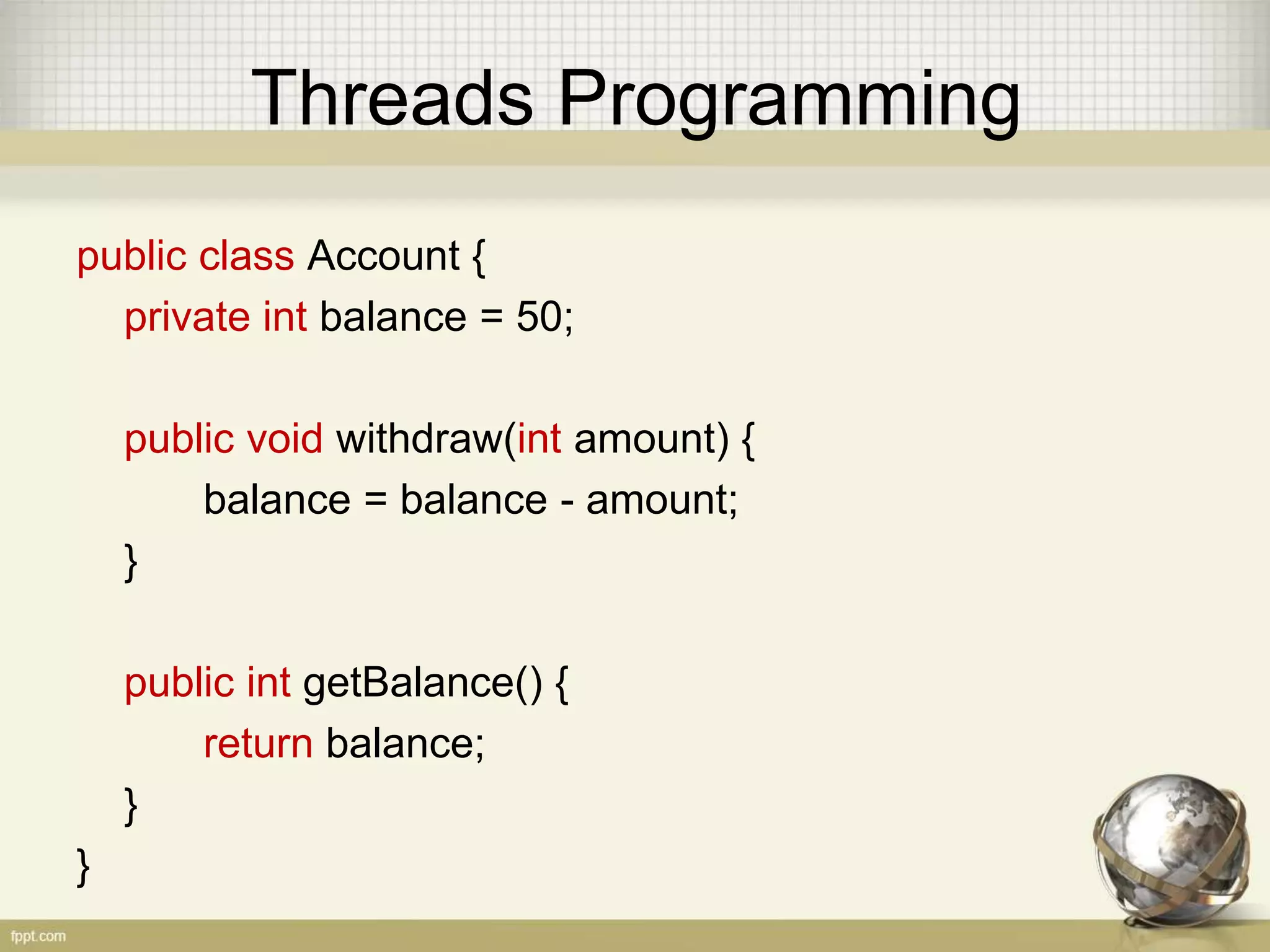
![Threads Advanced public class AccountTest { private Account account = new Account(); public void run() { for(int i = 0; i < 5; i++) { makeWithdrawal(10); if (account.getBalance() < 0) System.out.println("INSUFFICIENT BALANCE"); } } private void makeWithdrawal(int amount) { if(account.getBalance() >= amount) { System.out.println(Thread.currentThread().getName() + " is withdrawing"); account.withdraw(amount); System.out.println(Thread.currentThread().getName() + " complete withdrawing"); } else System.out.println(Thread.currentThread().getName() + " not enough: " + account.getBalance()); public static void main(String[] args) { AccountDanger r = new AccountDanger(); Thread a = new Thread(r, "Fred"); Thread b = new Thread(r, "Lucy"); a.start(); b.start(); } }](https://image.slidesharecdn.com/06javalanguageandooppartvi-140701210946-phpapp02/75/06-Java-Language-And-OOP-Part-VI-21-2048.jpg)
![Threads Advanced public class AccountTest { private Account account = new Account(); public void run() { for(int i = 0; i < 5; i++) { makeWithdrawal(10); if (account.getBalance() < 0) System.out.println("INSUFFICIENT BALANCE"); } } private synchronized void makeWithdrawal(int amount) { if(account.getBalance() >= amount) { System.out.println(Thread.currentThread().getName() + " is withdrawing"); account.withdraw(amount); System.out.println(Thread.currentThread().getName() + " complete withdrawing"); } else System.out.println(Thread.currentThread().getName() + " not enough: " + account.getBalance()); public static void main(String[] args) { AccountDanger r = new AccountDanger(); Thread a = new Thread(r, "Fred"); Thread b = new Thread(r, "Lucy"); a.start(); b.start(); } }](https://image.slidesharecdn.com/06javalanguageandooppartvi-140701210946-phpapp02/75/06-Java-Language-And-OOP-Part-VI-22-2048.jpg)
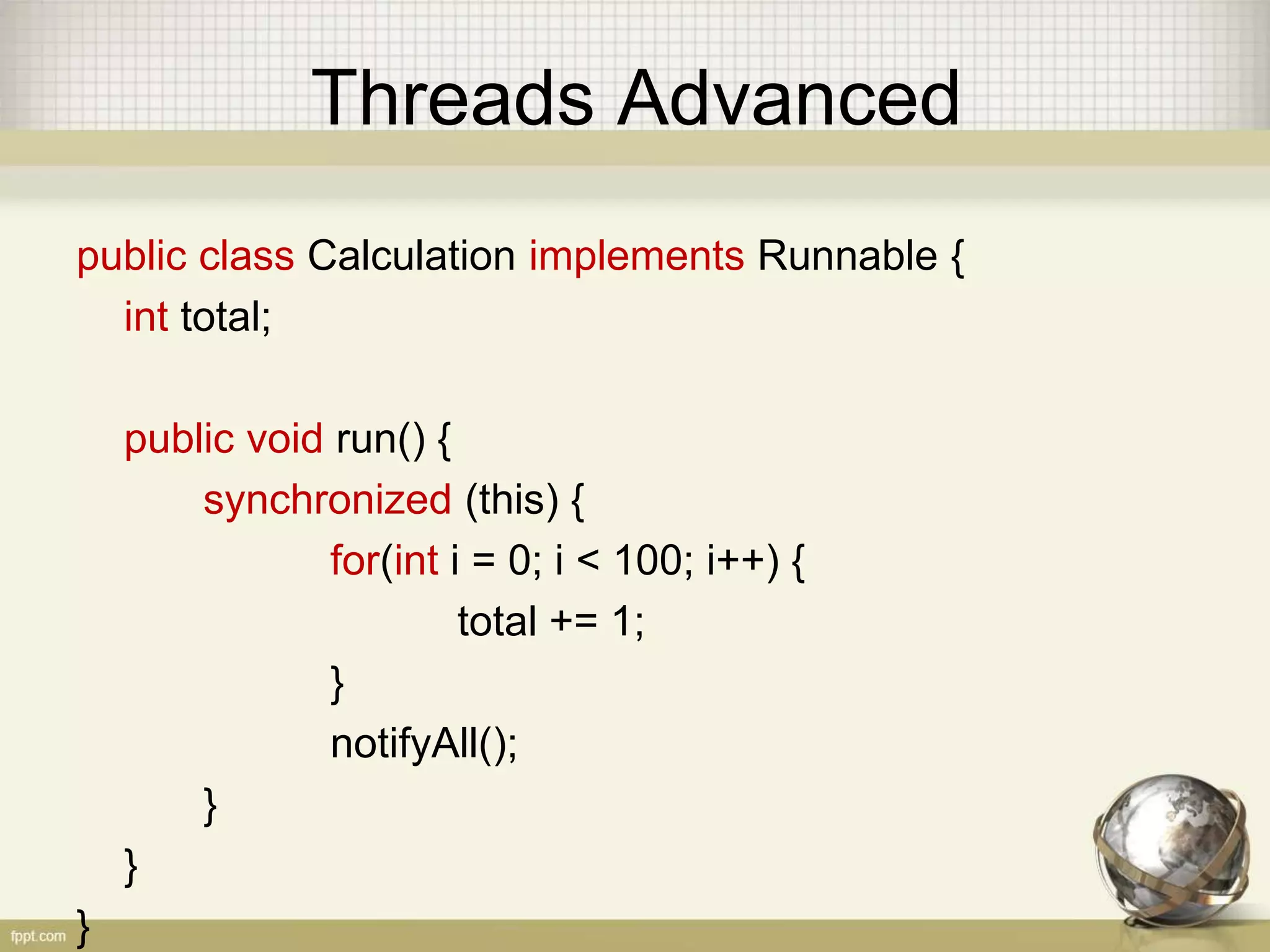
![Threads Advanced public class TestCalculation { public static void main(String[] args) { Calculation c = new Calculation(); Thread a = new Thread(c); a.start(); synchronized (a) { try { System.out.println(“Waiting till finish"); a.wait(); } catch (Exception e) { } System.out.println("TOTAL = " + t.total); } }](https://image.slidesharecdn.com/06javalanguageandooppartvi-140701210946-phpapp02/75/06-Java-Language-And-OOP-Part-VI-24-2048.jpg)
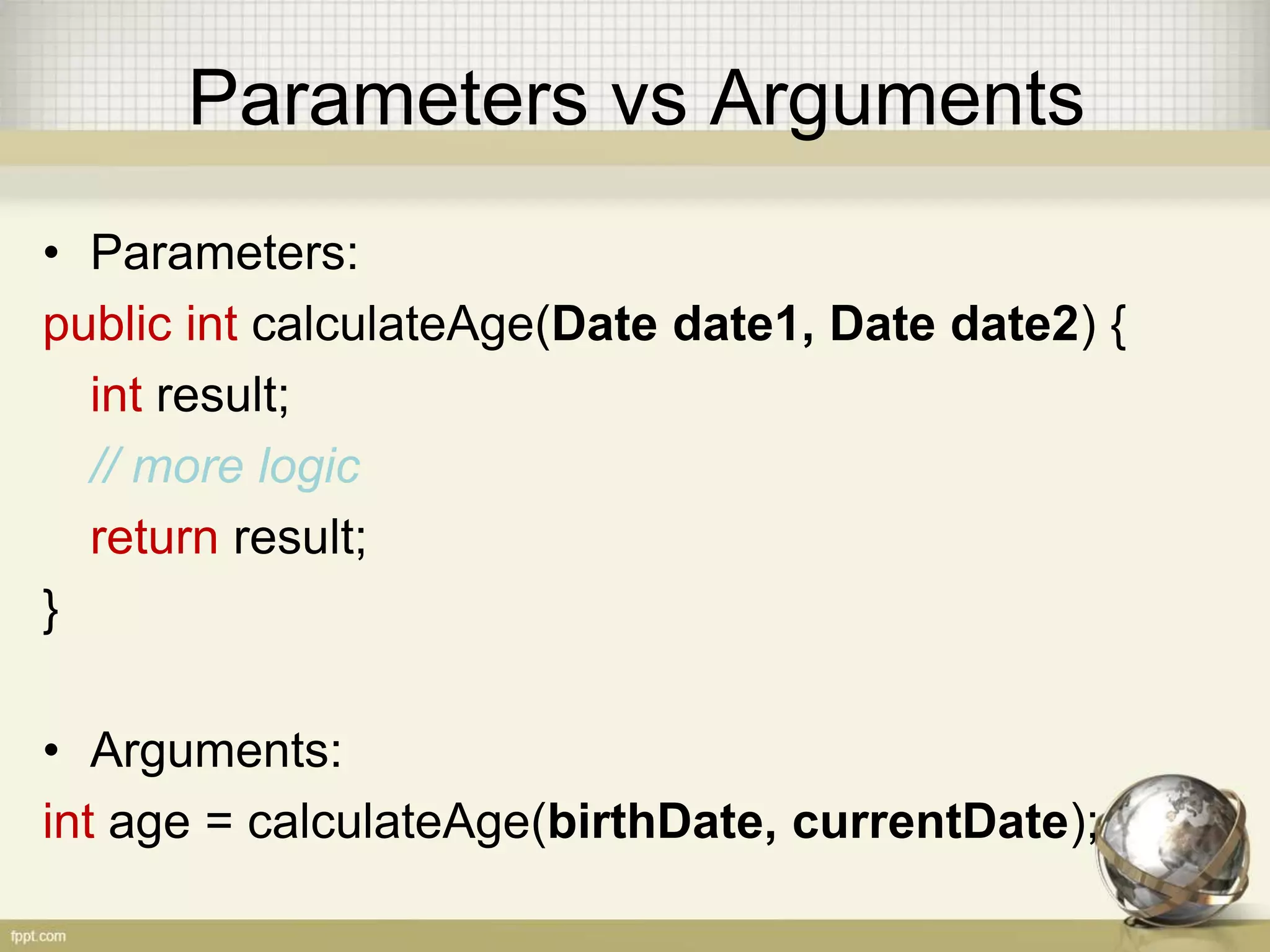
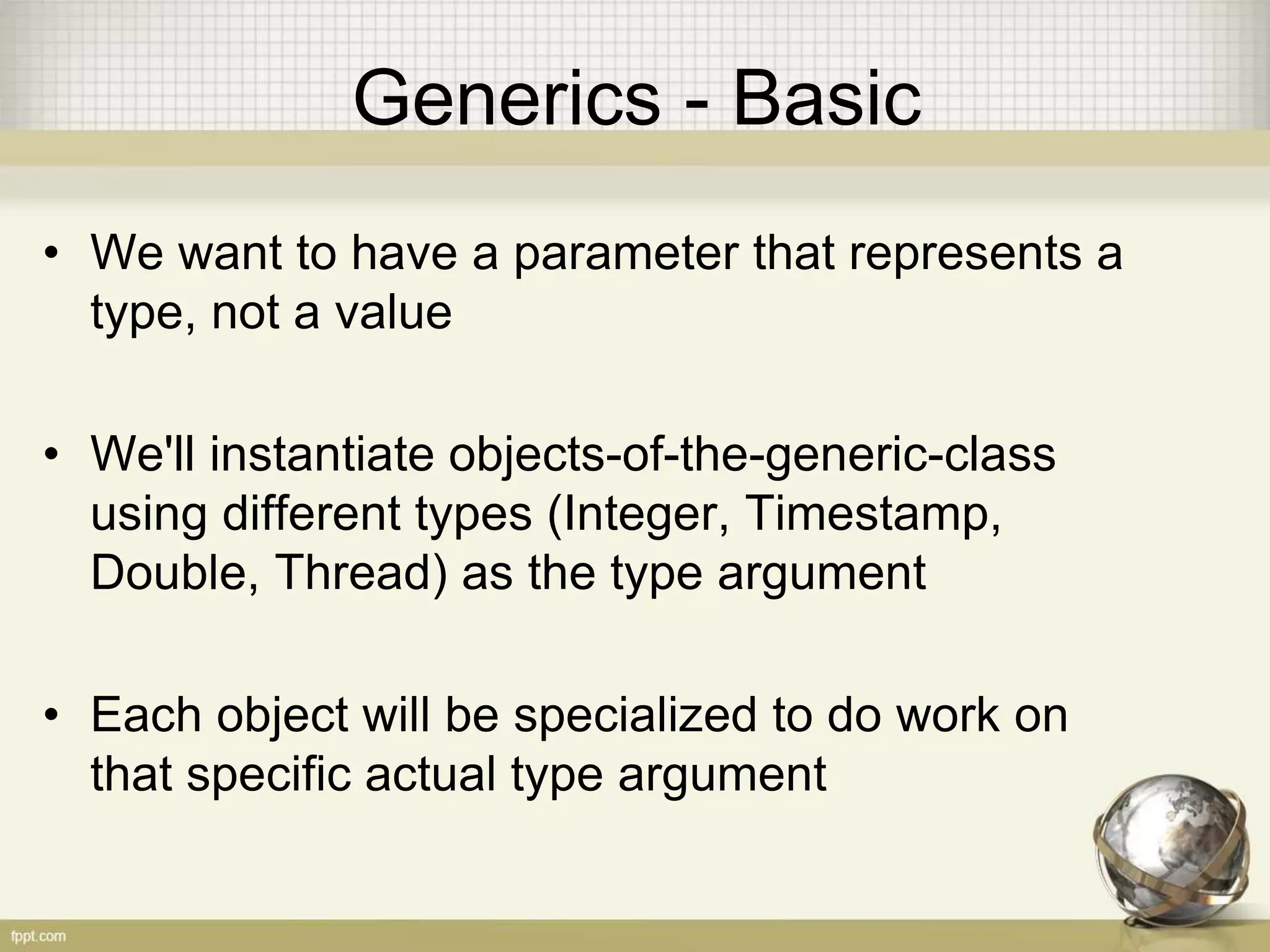
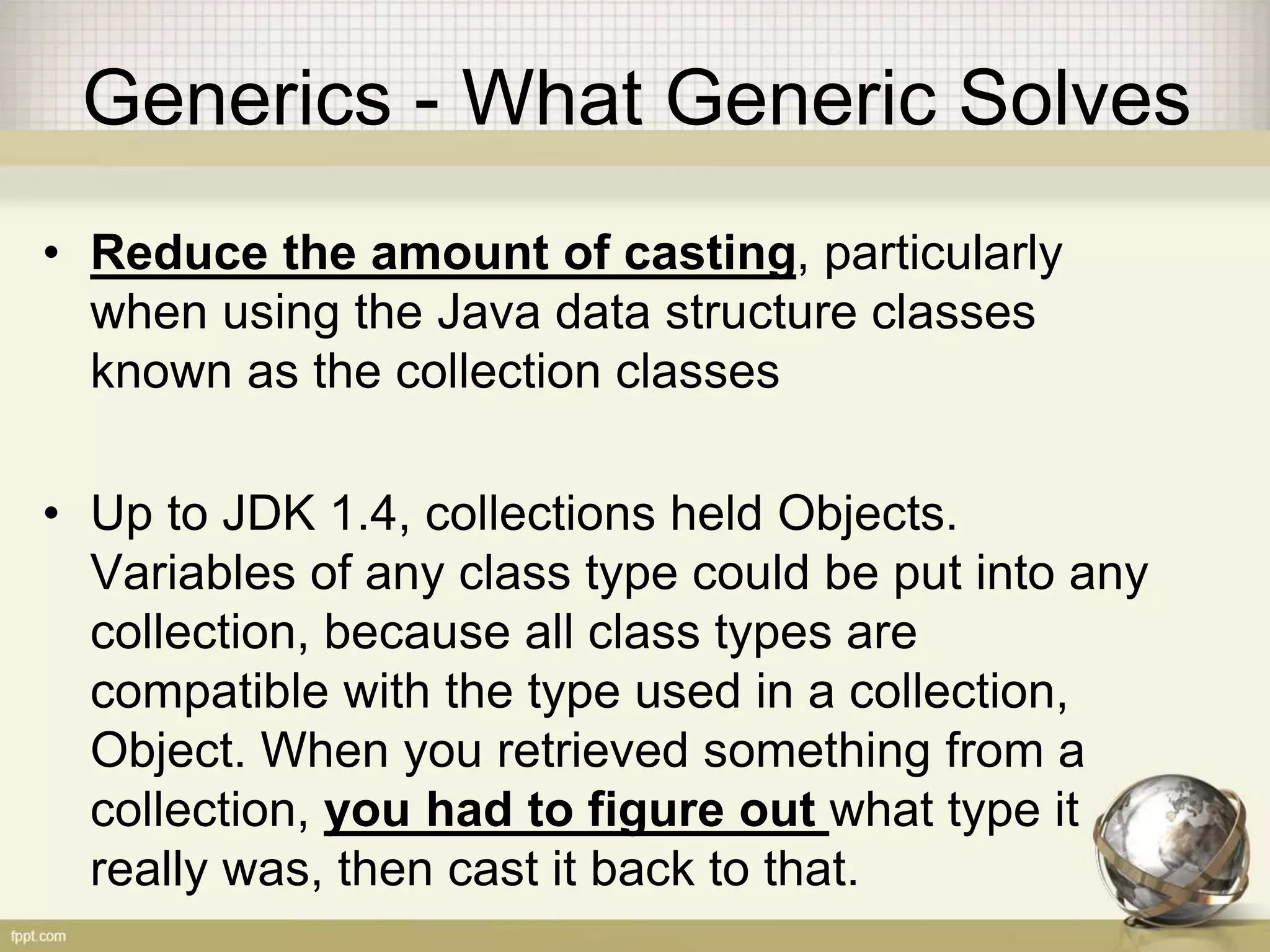
![Generics - What Generic Solves public static void main(String[] args) { List nonGeneric = new ArrayList(); nonGeneric.add(new Student("1", "Hari")); nonGeneric.add(new Student("2", “Solihin")); for(int i = 0; i < nonGeneric.size(); i++) { Student s = (Student) nonGeneric.get(i); System.out.println(s.getName()); } }](https://image.slidesharecdn.com/06javalanguageandooppartvi-140701210946-phpapp02/75/06-Java-Language-And-OOP-Part-VI-28-2048.jpg)
![Generics - What Generic Solves public static void main(String[] args) { List<Student> generic = new ArrayList<Student> (); generic.add(new Student("1", "Hari")); generic.add(new Student("2", “Solihin")); for(int i = 0; i < generic.size(); i++) { Student s = generic.get(i); System.out.println(s.getName()); } }](https://image.slidesharecdn.com/06javalanguageandooppartvi-140701210946-phpapp02/75/06-Java-Language-And-OOP-Part-VI-29-2048.jpg)
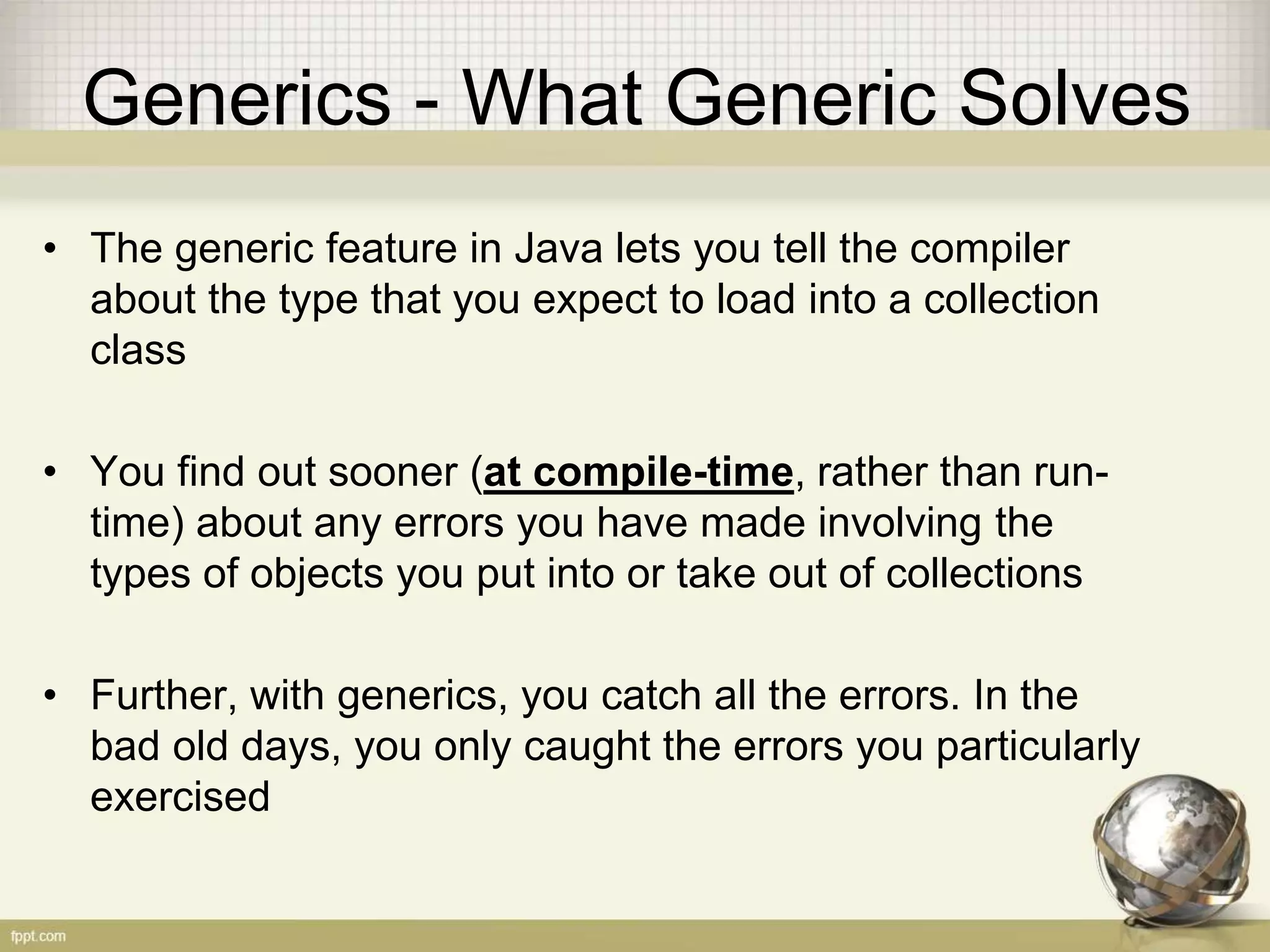
![Generics - What Generic Solves public static void main(String[] args) { List nonGeneric = new ArrayList(); nonGeneric.add(new Student("1", "Hari")); nonGeneric.add(new Student("2", “Solihin")); // No compile error, but will error in runtime nonGeneric.add(“Ardi"); for(int i = 0; i < nonGeneric.size(); i++) { Student s = (Student) nonGeneric.get(i); System.out.println(s.getName()); } }](https://image.slidesharecdn.com/06javalanguageandooppartvi-140701210946-phpapp02/75/06-Java-Language-And-OOP-Part-VI-31-2048.jpg)
![Generics - What Generic Solves public static void main(String[] args) { List<Student> generic = new ArrayList<Student>(); generic.add(new Student("1", "Hari")); generic.add(new Student("2", “Solihin")); // Compile error, so won’t be able to run generic.add(“Ardi"); for(int i = 0; i < generic.size(); i++) { Student s = generic.get(i); System.out.println(s.getName()); } }](https://image.slidesharecdn.com/06javalanguageandooppartvi-140701210946-phpapp02/75/06-Java-Language-And-OOP-Part-VI-32-2048.jpg)
![Generics - Code public class Generic<T> { public void getData(T data) { System.out.println(“Data = " + data.getClass()); } public static void main(String[] args) { Generic<Integer> t = new Generic<Integer>(); t.getData(new Integer(3)); } }](https://image.slidesharecdn.com/06javalanguageandooppartvi-140701210946-phpapp02/75/06-Java-Language-And-OOP-Part-VI-33-2048.jpg)
![Generics - Code public class Generic<T> { public void getData(T data) { System.out.println(“Data = " + data.getClass()); } public static void main(String[] args) { Generic<String> t = new Generic<String>(); t.getData(“”); } }](https://image.slidesharecdn.com/06javalanguageandooppartvi-140701210946-phpapp02/75/06-Java-Language-And-OOP-Part-VI-34-2048.jpg)
![Generics - Code public class Generic<T> { public void getData(T data) { System.out.println(“Data = " + data.getClass()); } public static void main(String[] args) { Generic<Student> t = new Generic<Student>(); t.getData(“”); } }](https://image.slidesharecdn.com/06javalanguageandooppartvi-140701210946-phpapp02/75/06-Java-Language-And-OOP-Part-VI-35-2048.jpg)
